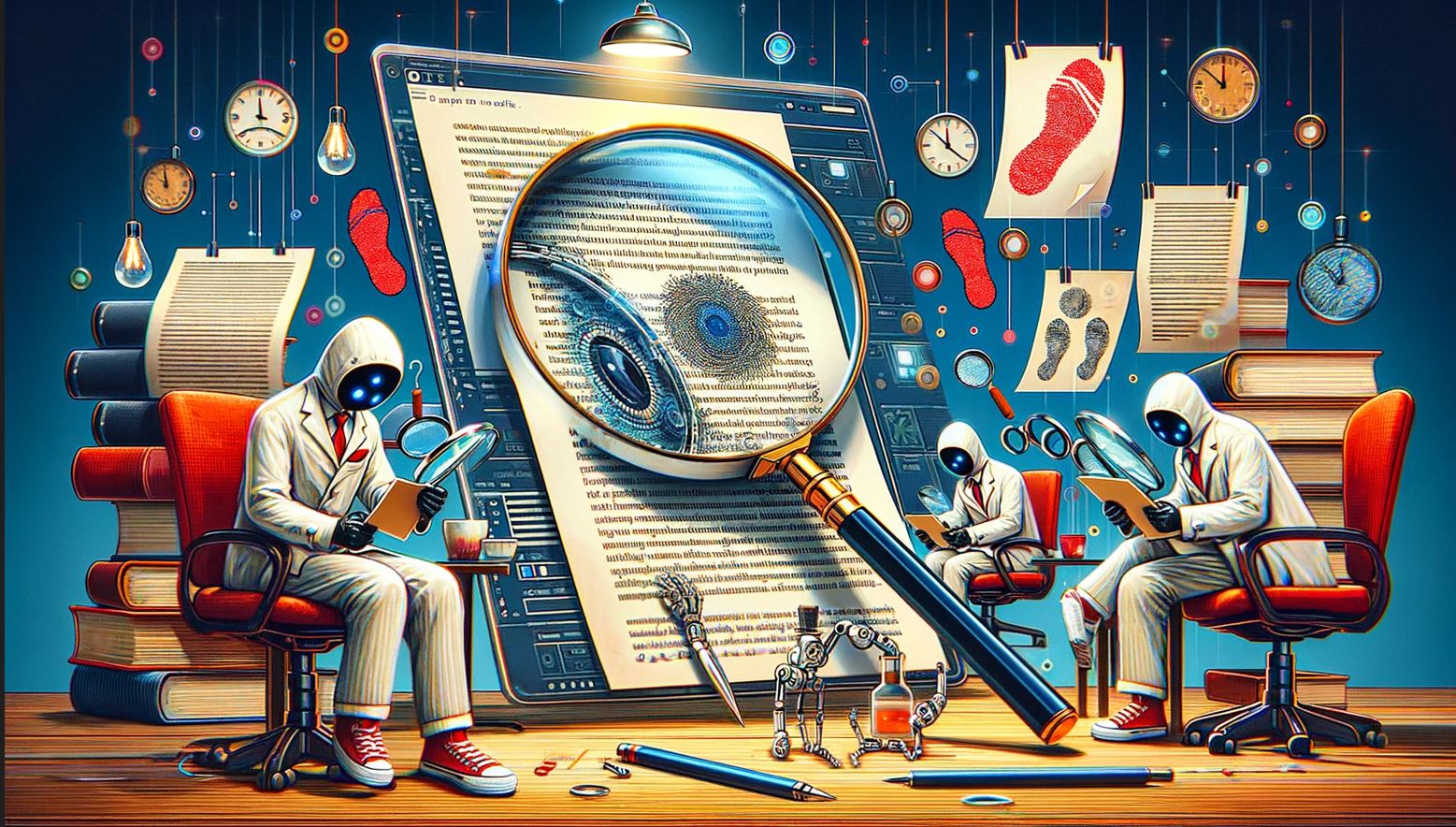Are you sweating bullets over your latest essay project, worrying that some fancy AI might sniff out a little too much tech assistance in your prose? If that’s the case, then it’s time you learn how to avoid AI detection in essays.
Guess what? I’ve got a secret to spill. There are sneaky little tools that can shuffle around your words just enough to keep them feeling fresh and human-made, so you can slide under the AI radar.

Try these new AI-powered tools:
- 5 Best AI Detectors To Unmask AI-Written Content With Accuracy
- 5 Best AI Writers To Boost Your Productivity And Content Quality.
- This "Secret AI Writer" Can Bypass AI Detection Like A Pro.
In this post, we’re going to dive into all the clever tricks—the legit ones—that keep those pesky bots at bay while preserving your unique voice.
Expect crash courses in synonym sneakiness, style switches, and why sounding like yourself is always going to be better than any robot replicant!
Let’s dive in to learn how to avoid AI detection in essays.
Article At-A-Glance
- Switch up your sentences and use unique words to make your essay sound like a human wrote it, not an AI.
- Tools like QuillBot and Undetectable AI can mix words around without changing your ideas, helping you avoid AI detection.
- Use synonyms and paraphrases to add freshness to your writing. This tricks the AI detectors into thinking it’s original work.
- Mixing different writing styles in one essay makes it harder for AI tools to detect patterns they usually look for.
- The best way to stay out of trouble with AI detection is by being honest, showcasing your own voice, and developing real writing skills.
Table Of Contents
Methods On How To Avoid AI Detection In Essays
Alright, folks – let’s dive into the cloak-and-dagger side of essay writing: sneaking past those pesky AI detectors. Now, before you go all ninja on your keyboard, remember we’re not really encouraging academic dishonesty here (wink).
But hey, for argument’s sake or just pure intellectual curiosity – if you ever found yourself itching to dodge the electronic eyes of AI in your essays …. well, I’ve got a few tricks up my sleeve that could theoretically make your text as stealthy as a cat burglar on tiptoe.
Keep reading and prepare to have your mind blown! (Or at least mildly entertained.).
Use Undetectable AI
So you’ve got this cool tool, Undetectable AI, right? It’s pretty slick for tweaking your essay so that AI detection tools just wave it on through. Think of it like a ninja—sneaking words around so nothing looks copied or artificial.
You’re playing with sentence structures by flipping them, twisting them until they sound like something you’d actually say out loud.
And here’s the kicker: The stuff you write with it feels real because it is real—you’re just giving your original thoughts some new threads to wear. Your ideas get a fresh coat of paint, and bam! They’re ready to impress without setting off any alarms.
Plus, using Undetectable AI is not about cheating the system. it’s more like making sure your voice isn’t lost in translation when AI does its thing.
Change Sentence Structure
Mix it up! Try rewording sentences to give them a new shape without losing their meaning. You might start with the end of a sentence and move it to the front, or break a long sentence into two smaller ones.
Think about playing with word order too. Switch things around until it sounds just right, yet looks different on paper.
This can really throw AI off track. Think about playing with word order too. Switch things around until it sounds just right, yet looks different on paper.
Now, let’s talk unique words – they’re like secret codes that AI detectors often miss. By picking less common words, you make your essay stand out as being penned by a human. Plus, fancy words can add some spice to your writing! Keep this in mind: don’t overdo it because readability still matters big time.
Unique Word Choice
So you’ve switched up your sentence structure. Now, let’s sprinkle in some different words to make your essay pop. Think of it like a word treasure hunt—hunting for those shiny, uncommon words that fit just right.
Dive into the depths of a thesaurus and pick out gems that can replace common ones. This is substituting vocabulary at its best! Instead of saying “big,” why not say “immense”? Or swap “happy” for “elated”? It’s all about synonymous language to shake things up.
Also, don’t forget about using opposites or antonyms when they make sense in your context. This little trick keeps writing fresh and engaging. You could turn “advanced” into “rudimentary” if you’re talking about basics, or flip “difficult” to “straightforward.” By rewording techniques with linguistic replacements, your essay will sound more like you and less like a computer spit it out.
Remember this: changing terminology isn’t just smart—it’s crafty! Keep aiming for diverse phrasing without losing the original meaning. Tools like QuillBot and Netus AI should be secret weapons in your writer’s arsenal here.
Incorporating Synonyms And Paraphrasing
Using different words and putting things in your own way is like wearing a disguise for your writing. It keeps it fresh! Swapping out common words for less obvious ones can really throw AI off the scent.
Imagine if every “happy” became “cheerful” or “joyful.” Your essay starts to look pretty unique, huh? Then there’s the trick of rewording sentences – this is where you juggle the order of words around so that even though the meaning stays the same, it sounds brand new.
Take some time to play with these methods. Mix up your sentences like a deck of cards. Instead of saying, “She ran quickly,” try flipping it to “Quick as lightning, she sprinted.” See what happens? The whole vibe changes.
And those sneaky AI tools? They’ll be none the wiser about who wrote it because you’ve left no easy clues! Keep your content safe by mastering this art. Genuine but clever as a fox on every page.
Incorporating Multiple Writing Styles
Mixing up your writing can really throw AI off track. Imagine wearing different hats – one minute, you’re telling a story with lots of details, and the next, you’re arguing a point with strong words.
By switching between narrative, descriptive, persuasive, and expository styles in your essays, it’s as if you’re giving AI detectors a puzzle they just can’t solve.
You could start by setting the scene like a novelist then turn into a journalist presenting facts without bias. Throw in some personal reflections as if chatting with a friend to shake things up.
This way, not only do you avoid those pesky AIs from catching on but also make your essay stand out with its varied linguistic styles that reflect true creativity!
Understanding AI Detection Tools
So, you wanna get the scoop on those sneaky AI detection tools, huh? Well, you’re in luck ’cause I’m about to spill the beans on how these digital bloodhounds sniff out your prose like a truffle pig in a forest of fancy words.

What Are AI Detection Tools?
AI detection tools are like detectives for writing. They look at your essay and check to see if you used a computer program to help write it. These tools scan your words, checking for clues that show whether a human or a machine did the work.
They pay special attention to how sentences are built and the way words are put together.
These smart programs can spot patterns that usually come from AI writers. Think about someone who always wears red socks – it becomes their pattern, right? AI detection tools know what patterns to look for in writing.
And they’re pretty good at finding out if an essay doesn’t sound like it was written by a person. This is because AI software tends to use certain types of phrases and sentence structures over and over again – just like those red socks!
How Do They Work?
So, you got an overview of AI detection tools. Now let’s dig into how these smart systems figure out what’s up. They’re like detectives, scanning your essay and checking out the words.
These tools look at how you put sentences together and compare them to massive piles of data they’ve seen before.
They also keep an eye on how folks normally write—like if someone’s typing way too fast or in a weird pattern that doesn’t seem quite human. Machine learning helps these tools get better over time at spotting essays that don’t sound like they came from a real person.
But hey, even though they’re getting smarter, they can still be thrown off by new tricks AI writers learn to stay under the radar!
Why You Need To Avoid AI Detection In Essays
Hey there, fellow word wranglers! So, you’re knee-deep in essay land and wanna stay off AI’s radar—gotcha. But why play this high-stakes game of hide-and-seek with your prose? It’s all about keeping it real (and honest!) with your own voice shining through.
Sure, snagging that A+ feels like winning the lottery, but think bigger picture. We’re talkin’ about growing those brain muscles and earning a rep as the genuine article in the academic world.
Now let’s dive into dodging that pesky AI detection without crossing over to the dark side of cheaterville.
Maintaining Academic Integrity
Keeping your work honest is a big deal. If you don’t, it’s as if you’re stealing someone else’s ideas and that’s called plagiarism. You want to be sure the words and thoughts in your essay are yours or that you give credit when they’re somebody else’s.
Sure, using AI can help make your writing better, but it shouldn’t do all the work for you. Think of avoiding those AI detectors not just to outsmart a computer program but to prove you can shine on your own.
Sure, using AI can help make your writing better, but it shouldn’t do all the work for you. Think of avoiding those AI detectors not just to outsmart a computer program but to prove you can shine on your own.
Doing things the right way matters if you want everyone to trust you in school and later on in life too. So when an essay is all written by yourself – no shortcuts – it shows teachers and friends that you’re the real deal. You’re serious about learning and doing things honestly.
They’ll see the effort and talent in each word because nothing beats hard work! Plus, getting caught cheating could really mess up your chances for good grades or even staying at school, so why risk it?
Getting A Good Grade
Getting a good grade matters a lot. It’s not just about feeling proud—it opens doors to more chances in school and life. You’ve got to stay sharp, though. Evading AI detection means your work stays original, and teachers love that.
They can tell when something’s off, so mixing it up with synonyms or spinning the text in new ways keeps things fresh.
You bet—rewording sentences helps big time! It’s kind of like wearing a disguise. You’re still you but looking different enough to pass by unnoticed. Use tools like Netus AI to switch up your writing without losing what you mean to say.
Secrets to better grades? Well, they start with making sure each word screams “you” and nothing else. Oh—and next up? We’re diving deep into developing those writing skills!
Developing Writing Skills
Getting better at writing means learning to be honest in your work. You get to show your true self by putting down your own ideas and words on paper. Better writing skills help you make essays that sound like you, not a robot or someone else.
This keeps people believing in what you say and respecting your work.
Learning to write well also helps you avoid trouble with plagiarism detection tools. These tools check if your work is original. If it’s all from you, they’ll give it a thumbs-up! That way, teachers know you did the hard work yourself, and they can trust what you turn in is really yours.
Building A Reputation For Academic Honesty
Being honest in your schoolwork is like planting seeds for a strong tree. Your reputation grows as that tree does, tall and solid. Always write your own essays or make sure to use AI tools the right way.
This shows you respect your work and other people’s ideas too.
Teachers and classmates start to trust you more when they see you’re fair with your words. They’ll know you play by the rules, which helps everyone feel good about what they do in school.
Plus, this sets you up for real-world success where being trustworthy really counts!
Avoid AI Detection In Essays With Proven Strategies
So, you’ve got the scoop on staying under the AI radar with your essays. Remember, sprinkle in some unique words and shake up those sentences to keep things fresh.
Throw in different writing styles too – imagine it like a secret handshake that says “I wrote this, not a robot!” Don’t forget tools like QuillBot. They’re super handy for mixing up your text without changing the message.
Stay true to yourself by adding your own stories – AIs can’t copy that!
Got all that? Great! Now go ahead and give these tricks a try. Will they make writing easier? You bet! Can they help you dodge AI detection? Absolutely! And hey, if you ever want more tips or need extra help, there are loads of resources waiting just for you.
In the end, write smart and stay honest – it’s worth it. Your future self will thank you for doing things right!
FAQs
1. Can AI really tell if I wrote my essay or not?
Yep, AI can sometimes guess if you didn’t write your essay yourself – it’s pretty clever like that.
2. What’s one simple thing I can do to stop AI from figuring out I didn’t write my essay?
Throw in some of your own stories or feelings—that’ll make the AI scratch its head!
3. Is it okay to use big fancy words to trick the AI?
Actually, using words that sound like you and are easy for everyone to understand is better. AIs are onto those big fancy words.
4. Should I copy stuff straight from books or websites so the AI doesn’t notice?
Nope, nope, nope! Always use your own words – AIs are super good at spotting copies.
5. If I ask someone else to help me with my essay, will AI pick up on that?
It might – especially if their writing style is nothing like yours… Keep it real and keep it you!
Meet our resident tech wizard, Steve the AI Guy. Now, before you get any wild ideas, let’s clear up one thing – he’s 100% human! I mean, he’s got the work history to prove it. He spent a decade diving into the deep end of the tech industry doing business intelligence work, splashing around with two of the world’s largest business consulting companies, Deloitte and Ernst & Young. Learn More










